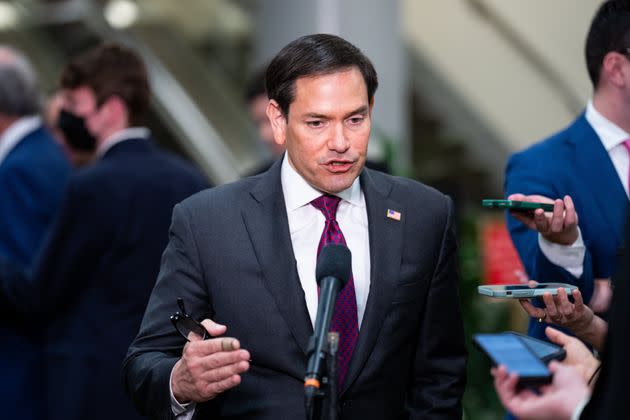Pro-Israel Republicans See What They Want To See In Trump's Skepticism Of Gaza War
- Oops!Something went wrong.Please try again later.
WASHINGTON ― Republican senators promise they haven’t heard about former President Donald Trump’s cosmetic concerns about Israel’s invasion of Gaza.
And if they have, maybe he meant something totally different? Maybe his concerns were wholly correct? Or even mostly wrong?
HuffPost asked nine GOP senators earlier this week about Trump’s comments, in which he insisted images of the war were costing Israel support. Their responses ― or lack thereof ― speak to the creativity with which GOP lawmakers address disagreements with the de facto leader of their party, even eight years after he emerged as a major political force.
In a late March interview with the right-wing Israeli outlet, Israel Hayom, Trump urged Israel to “finish up your war,” because the images of death and destruction in Gaza are costing “Israel a lot of support.” More than 33,000 Palestinians have died in Israel’s invasion, and the U.S. government believes the region is facing a famine.
Given a chance to walk back his remarks, Trump doubled down in an early April interview on the Hugh Hewitt Show, a popular conservative radio program.
Hewitt asked Trump twice whether he is still standing “100% with Israel,” and Trump did not provide a clear answer.
“I’m not sure that I’m loving the way they’re doing it, because you’ve got to have victory,” he replied. “You have to have a victory, and it’s taking a long time.”

Trump’s criticism of Israel is largely about public relations rather than civilian casualties: He says its government is releasing too many photos and videos of its bombing runs, and needs to find a way to wrap the war up so it doesn’t look bad. At the same time, he continues to campaign on his record of virtually unprecedented support for Israeli government policies, such as his recognition of the country’s annexation of the Golan Heights ― and lash out at Jewish Americans for not supporting him in greater numbers.
Still, Trump’s comments to Hewitt and Israel Hayom are notable because of how different they sound from Republican members of Congress’s full-throated support for Israel’s war.
Of course, precious few Republican members of Congress want to publicly break with Trump.

He Really Meant Something Different
Sen. Marco Rubio (R-Fla.) is one of the Senate’s most outspoken defenders of Israel, including its prosecution of the war in Gaza. He has said that the Palestinian militant group Hamas, whose Oct. 7 terror attack on Israel provoked the Gaza war, is “100% to blame” for the deaths of tens of thousands of Palestinian civilians, and called on President Joe Biden to stop criticizing the Israeli government.
But he was unfazed by Trump’s remarks on the topic, construing them as essentially uncritical of Israel.
“I think that’s his way of expressing that he hopes Israel can win and get this thing over with,” Rubio told HuffPost. “He was the most pro-Israel president of my lifetime.”
The bottom line is, they’ve gotta kill all the Hamas members.Sen. Rick Scott (R-Fla.)
Sen. Charles Grassley (R-Iowa) took a similar tack, claiming that Trump had clarified his remarks.
“You’re going back two interviews,” he told HuffPost. “He had an interview since then that modified his original statement.”
Grassley appeared to be referring to Trump’s Monday interview with Wayne Root on “Real America’s Voice,” a right-wing streaming show. In that conversation, Trump emphasized his pro-Israel record and argued that U.S. Jews who vote for Biden “do not love Israel,” but did not walk back his original comments about Israel’s war making the country look bad.
Likewise, in remarks to reporters on Wednesday, Trump claimed Biden had “totally abandoned” Israel, and lambasted Jews who don’t support him, but did not address Israel’s conduct.
What Trump Comments?
Sen. Rick Scott, the other Republican senator from Florida, declined to engage when asked to respond to Trump’s view that Israel is “losing the PR war.”
“The bottom line is, they’ve gotta kill all the Hamas members,” he replied.
What about Trump’s remarks on the war hurting Israel’s image?
“They’ve gotta kill all the Hamas members as fast as they can,” he repeated.
Sen. John Boozman (R-Ark.) claimed that he hadn’t heard what Trump said.
“I have no comments about that,” he said. “I don’t know what he said.”
Sen. James Lankford (R-Okla.) also said he was unfamiliar with the remarks and would not address a summary of them without seeing them himself. “I’d have to hear it in context,” he said.
Sen. Shelley Moore Capito (R-W.Va.) simply declined to comment without saying anything more.

Polite Disagreement
Sen. Mitt Romney (R-Utah), the GOP Senate conference’s most vocal Trump critic, responded to the question by articulating his own pro-Israel perspective.
“Israel is doing what any nation would do, which is to protect themselves from attack, and they obviously want to do that as quickly as they possibly can with as few civilian casualties as possible,” he said.
Pressed on whether Trump might be deliberately backing away from Israel, Romney replied, “I don’t worry about what President Trump has to say about it.”
Sen. Josh Hawley (R-Mo.) disagreed with Trump’s view that Israel needs to finish up the war, because of how it is hurting the country’s image.
“I wouldn’t say that. I mean, my view is that we ought to stand with our ally Israel. Do we want to urge them to be prudent? Yeah, of course. And to avoid the unnecessary loss of civilian life? Yeah sure,” he said. “But let’s not be holier than thou. I mean, we’ve killed a lot of civilians in numerous wars … At the end of the day, they’ve got to protect themselves, and they’ve got to root out Hamas.”
Hawley went on to argue that Biden is only pressuring Israel now to “appease the increasingly vocal, frankly, pro-Hamas wing of their party.”
Who might Trump be appeasing then with his notes of ambivalence?
“I think he and Biden’s positions are pretty different on this,” he said. “But all I can say is that I think we should stand with Israel.”
Rand Stands Alone
Sen. Rand Paul (R-Ky.) told HuffPost that he was unfamiliar with Trump’s comments.
But the libertarian-leaning senator, known for his skepticism of American entanglements with foreign countries, took the opportunity, unprompted, to express his theoretical support for conditioning U.S. aid to Israel, or any other country.
“Aid we give to any country, including aid we give to allies, should be conditional,” he said.
Aid we give to any country, including aid we give to allies, should be conditional.Sen. Rand Paul (R-Ky.)
As an example, Paul said that Trump did nothing wrong when he pressed Ukrainian President Volodymyr Zelenskyy in 2019 to investigate Biden’s efforts to get a Ukrainian prosecutor fired while serving as vice president, and another item of interest to Trump, at a time when Ukraine was seeking U.S. military aid. Trump’s phone call with Zelenskyy led House Democrats to impeach him on the grounds that he had leveraged U.S. aid to secure personal favors.
Referring to the 2019 impeachment, Paul said, “I said at the time and I still continue to say that all of our aid should be quid pro quo, it all should be conditional.”
Returning to the subject of Israel, Paul said, “The war isn’t just theirs to execute. It’s ours to comment on. And there comes a time in a war when there’s a possibility that as more civilians die, you create more terrorists in reaction to that interaction.”
Paul would not say whether he feels that the time has come to demand more of Israel.
